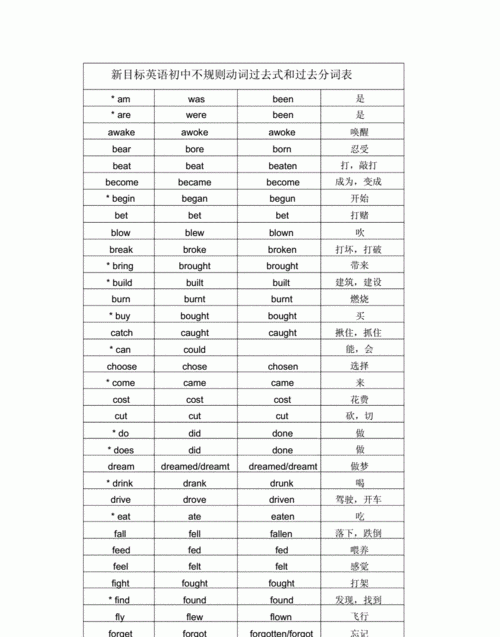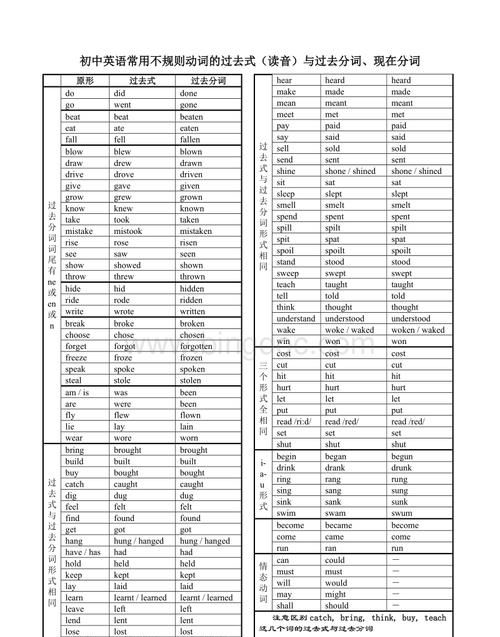本文目录

动词的过去分词有哪些形式
英语中常用的过去分词可比较多啊,如:
come(来),gone(去),put(放),lost(丢失),thought(想)等等等等。。。
过去式和过去分词的不规则形式要靠记的,这里有个归纳可供参考:
一、原形、过去式和过去分词的词形和读音都相同的单词,结尾字母一般是t或d。如:
cut-cut-cut, hit-hit-hit, put-put-put, cost-cost-cost, let-let-let, shut-shut-shut, set-set-set, hurt-hurt-hurt, spread-spread-spread
特殊:动词read的过去式和过去分词虽然词形与原形一致,read-read-read,但发音分别是[ri:d]-[red]-[red]。
二、有些动词的过去分词与原形是一样的。如:
come-came-come, become-became-become, run-ran-run, overcome-overcame-overcome
三、有些动词的过去式和过去分词相同。如:
1. 把单词结尾的字母d改为t。如:
lend-lent-lent, spend-spent-spent, send-sent-sent
2. 改变单词中间元音字母。如:
sit-sat-sat, win-won-won, shine-shone-shone, hold-held-held
3. 以eep结尾的动词,把eep改为ept。如:
keep-kept-kept, sleep-slept-slept, sweep-swept-swept
4. 过去式和过去分词都以augh或ough结尾的动词。如:
buy-bought-bought, fight-fought-fought, think-thought-thought, bring-brought-brought, teach-taught-taught, catch-caught-caught
5. 有的以ay结尾的动词,在过去式和过去分词中把ay变成aid。如:
say-said-said, lay-laid-laid, pay-paid-paid
6. 另有一些其它形式的变化。如:
have-had-had, learn-learnt-learnt, leave-left-left, lose-lost-lost, make-made-made, meet-met-met, feel-felt-felt
四、有些动词原形中含有字母i,在过去式中变i为a,在过去分词中变i为u。如:
五、以字母ow或aw结尾的动词,在变成过去式时,通常把元音字母变成e,在变成过去分词时,通常只在词尾加n。如:
blow- blew- blown, draw-drew-drawn, grow-grew-grown, throw-threw-thrown, know-knew-known
六、有些动词的过去分词是在原形词尾加n或en,变成以en结尾的单词。如:
rise-rose-risen, give-gave-given, take-took-taken, fall-fell-fallen, drive-drove-driven, eat-ate-eaten
特殊: write-wrote-written, speak-spoke-spoken, ride-rode-ridden, get-got-gotten

英语的过去式和过去分词的用法
过去式和过去分词的用法如下:
1、过去式:
一般过去时表示在过去某个特定时间发生,也可以表示过去习惯性、经常性的动作。一般不强调动作的影响,只说明事情。
句式:主语+动词过去式+宾语+其它
I had a word with Julia this morning.今天早晨,我跟朱莉娅说了几句话。
He smoked many cigarettes a day until he gave up. 他没有戒烟的那阵子,抽烟抽的可凶了。
一般过去时常与表示过去的时间状语或从句连用,如:yesterday,last week ,in the past ,in 1993,at that time,once,during the war,before,a few days ago,when 等等。
2、过去分词:
作表语,The city is surrounded on three sides by mountains. 这座城市三面环山。
作定语的过去分词相当于形容词,其逻辑主语就是它所修饰的名词。及物动词的过去分词作定语,既表被动又表完成;不及物动词的过去分词作定语,只表完成。
作状语,过去分词作状语表示被动的和完成的动作。

扩展资料:
过去式与过去分词的区别:
过去式是限定动词,只能用在直接接主语(和主语之间没有其它的动词)的场合。而过去分词是非限定动词,不能直接接主语,如果用在接主语的场合,必须在主语和过去分词之间增加一个助动词。
动词的过去式和过去分词实际上都是用来描述一个“已经发生的行为”,区别只是着重点不同。过去式着重点在“行为本身”,过去分词着重点在“行为的结果或影响”。
参考资料来源:百度百科-过去式
参考资料来源:百度百科-过去分词
什么时候用动词的过去分词形式
英语语法之动词的过去分词形式
动词的-ed形式也是非谓语动词的一种,它具有动词的一些特点,同时也具有形容词、副词的句法功能,在句中可用作表语、定语、状语和宾语补足语等。

一、动词的-ed形式的特征
(一)动词的-ed形式是由动词的过去分词构成
动词的-ed形式只有一种形式,即传统语法中的过去分词。绝大部分的动词的-ed形式由动词原形加-ed构成,也有一些动词的-ed形式是不规则的。
1、规则动词的-ed形式
limit→limited(限制)
pretend→pretended(假装)
escape→escaped(逃脱)
provide→provided(提供)
refer→referred(提交)
drag→dragged(拖)
pray→prayed(祈祷)
supply→supplied(供应)
2、不规则动词的-ed形式
cast→cast(投掷)
spread→spread(传播)
bite→bitten(咬)
forgive→forgiven(原谅)
spit→spat( 吐)
wear→worn(穿)
fight→fought(搏斗)
lose→lost(丢失)
3、少数动词的-ed形式作定语时,读音与一般过去分词不同
learned:a learned professor 一位知识渊博的教授
aged:an aged man 老人
beloved:his beloved computer 他心爱的计算机
(二)动词的-ed形式的否定形式
动词的-ed形式的否定形式是由not或never加动词的-ed形式构成。
Not allowed to go in, he had to wait outside.
不允许他进去,他只好在外面等着。
(三)动词的-ed形式的特征
动词的-ed形式有被动的意思,有时也可表示完成的动作。
1、动词的-ed形式表示已完成的动作。
除了作形容词用的-ed形式外,动词的-ed形式可带有完成的意义,有的同时也带有被动的意义。
Bornand brought up in the countryside, he was interested in biology.
由于在农村出生并长大,他对生物很感兴趣。
2、及物动词的-ed形式一般表示被动的意思。
Given more time, I could have solved that riddle.
要是有充足的时间,我就能猜出那个谜语。(句子的主语I 和动词give之间是被动关系。)
3、不及物动词的-ed形式只表示完成的意思,并不带有被动的含义。
an escaped prisoner 逃犯 (= a prisoner who hasescaped)
二、动词的-ed形式的用法
动词的-ed形式在句中主要起形容词和副词的作用,可以作定语、表语、状语和补语。
(一)动词的-ed形式作表语
1、-ed形式在连系动词后作表语,说明主语的状态。
The students are fully prepared.
学生们已做好了充分的准备。
【比较】要把-ed形式作表语和被动语态区别开来。作表语的-ed形式表示状态,被动语态中的.-ed形式表示被动动作。
All the doors are locked.
所有的门都是锁着的。(-ed形式作表语,表示状态)
All the doors were locked by the guard.
所有的门都被卫兵锁上了。(被动语态,表示动作)
Peter the Great is buried here.
彼得大帝就埋葬在这里。(-ed形式作表语,表示状态
Peter the Great was buried here in 1725.
彼得大帝于1725年被埋葬在这里。(被动语态,表示动作)
(二)同一动词的-ed形式与-ing形式作表语时的区别
动词的-ed形式作表语,主要表示主语的心理感觉或所处的状态,含有被动的意思,而-ing形式作表语多表示主语具有的特征,含有主动的意思。
They were frightened to hear the frighteningsound.
他们听到那可怕的声音很害怕。
At the sight of the moving scene, all thepeople present were moved.
看到这么动人的情景,所有在场的人都感动了。
【提示】上述动词的-ed形式,有的(如pleased,tired, excited, disappointed等)已经变成形容词,可以被very, too等副词修饰。有的(如amused, puzzled, relaxed等)还不能被very, too修饰,只能被much修饰。
These problems are very puzzling.
这些问题很令人迷惑。
We are much puzzled by his failure toreply.
他不给我们回信使我们百思不得其解。
His speech was very moving.
他的演讲非常感人。
All the people present were moved to tears.
在场的所有人都被感动得流泪了。
(三)动词的-ed形式作宾语补足语
当作宾语补足语的动词和前面的宾语之间是被动关系时,一般应用动词的-ed形式作宾语的补足语。
1、在感觉动词see, hear, feel, notice, watch, find后作宾语补足语。
I heard the Ninth Symphony played last night.
昨晚我听了第九交响乐的演奏。
We found all the rivers seriously polluted.
我们发现所有的河流都被严重污染了。
Yesterday I noticed a little girl caught stealing in the shop.
昨天我在商店里注意到一个小女孩偷东西被抓住了。
He felt his collar pulled by someone from behind.
他感觉到衣领被人从后面拉了一下。
2、在使役动词get, have, make, leave, keep等后作宾语补足语。
(1)动词的-ed形式作get的宾语补足语。
Doris got her bad tooth pulled out in the hospital.
多丽丝在医院把坏牙拔了。
I'll just get these dishes washed and then I'll come.
我得先把盘子洗了,然后就来。
【比较】动词get后也可接动词不定式或动词的-ing形式作宾语补足语,和宾语是主动关系。
He got his sister to help him with his clothes.
他让姐姐帮他洗衣服。
It is not hard to get him talking; the problem is stopping him! 让他说话不难,难的是说开了止不住他。
Can you really get that old clock going again?
你真的能让那辆旧钟再走起来吗?
(2)动词的-ed形式作make的宾语补足语。
He raised his voice in order to make himself heard.
他提高了嗓门为了使别人听清他的讲话。
You should make your views known to thepublic.
你应该让公众知道你的观点。
【注意】动词make后的宾语补足语可用不带to的动词不定式或动词的-ed形式,但不可用动词的-ing形式。
(误)Can you make the students understanding the text?
(正)Can you make the students understand thetext?
(正)Can you make the text understood by the students?
你能让学生理解这篇课文吗?
(3)动词的-ed形式作keep或leave的宾语补足语。
They all went home, leaving all the workundone.
所有的工作都没完成,他们就回家了。
The detective and his assistant kept themselves locked in the room all night. 侦探和他的助手把自己整夜反锁在房间里。
3、动词的-ed形式也可用在with(without)结构中,作介词的宾语补足语。
With everything well arranged, he left theoffice.
一切都安排妥善之后,他离开了办公室。
She has come back with her backpack filled with interesting picture-books.
她已经回来了,背包里塞满了有趣的图书。
Without any grain left in the house, thelittle girl had to go begging.
家里没有粮食,小女孩只好出去讨饭。
Without any more time given, we couldn't finish the task in three weeks.
如果不再给我们任何时间的话,我们三星期之内完成不了任务。
4、某些动词后(如want, need, prefer, would like等),作宾语补足语的不定式被动形式省略“to be”,就成了-ed形式作宾语补足语。
I would like this matter (to be) settled immediately.
我希望这事立即得到解决。
I'd prefer this book translated by my sister.
我情愿让我妹妹来翻译这本书。
We need the work (to be) finished by Saturday.
我们需要这项工作周六之前完成。
The peasants don't want good farmland (to be) built on.
农民们不想让好好的农田被用来建造房子。
(四)动词的-ed形式作定语
动词的-ed形式作定语修饰名词分为前置和后置两类。
1、前置定语
单个的动词的-ed形式作定语一般放在被修饰的名词之前,作前置定语。
A watched pot never boils.
心急锅不开。
All the broken doors and windows have been repaired.
所有的坏门窗都修好了。
When we arrived, we each were given a printed question paper.
我们到达的时候,每人被发给了一份印制好的试卷。
【提示】如要表示强调,单个动词-ed形式也可作后置定语。
Money spent is more than money earned.
入不敷出。
2、后置定语
作后置定语的-ed形式一般都带有修饰语或其他成分,在语法上相当于一个定语从句。
We have read many novels written by this author.
我们读过这个作家写的许多小说。
(= that are written by this author)
Half of the honoured guests invited to the reception were foreign ambassadors.
被邀请到招待会上的贵宾有一半都是外国大使。
(= who had been invitedto the reception)
The meeting, attended by one thousand students, was a success.
这次会议获得很大的成功,共有一千名学生出席了。
(= which was attended by one thousand students)
A woman, dressed like a lawyer, came in and took her seat as judge.
一个律师装扮的女人走了进来,并作为法官就座。
(= who was dressed like a lawyer)
3、动词的-ed形式作定语和-ing形式作定语的区别
动词的-ed形式作定语表示动作已完成或和被动,而-ing形式作定语表示动作正在进行或和主动。
the risen sun 升起了的太阳
the rising sun 正在升起的太阳
boiled water 开水
boiling water 正沸腾的水
developed countries 发达国家
developing countries 发展中国家
fallen leaves 落叶
falling leaves 正在飘落的叶子
changed condition 改变了的情况
changing condition 变化着的情况
(五)动词的-ed形式作状语和-ing形式作状语一样,也可以表示时间、原因、条件、让步、方式或伴随情况等
1、表示时间
动词的-ed形式作状语表示时间,相当于一个时间状语从句。
Seen from the tower, the city looksbeautiful.
从塔上往下看,城市显得很美丽。
(= When the city is seen from the tower...)
Shown the lab, we were taken to see thelibrary.
带我们参观了实验室之后,又带我们参观了图书馆。
(= After we had been shown the lab...)
Completely examined by the doctors, he went back to school right away.
经过医生彻底检查以后,他立刻回到了学校。
(= After he was completely examined...)
【提示】有时动词的-ed形式前可加连词when或while来强调时间概念。
When asked why she was late for class again,she hung her head in shame.
当被问到为什么上课又迟到时,她羞愧地低下了头。
Once recovered, he went all out to do hiswork.
一恢复健康,他就全力以赴地干起了工作。
Once started, the clock will go half a month and keep good time.
一旦给这钟上了发条,它就会走半个月,并且走得很准。
2、表示原因
动词的-ed形式作状语表示原因,相当于一个原因状语从句。
Moved by the heroic deeds, the childrencouldn't help crying.
孩子们被英雄事迹感动,情不自禁地哭了起来。
(= Since they were moved by the heroic deeds ...)
Written in haste, her letter is very hard toread.
因为写得快,她的信很难阅读。(=As it was written in haste ...)
Excited by the new discovery, we decided to go out and celebrate.
我们因为新发现而激动万分,决定出去庆祝一下。
(Because we were excited by...)
【注意】为了使-ed形式表示的条件、动词让步意义更加明显,我们可以加上适当的连词。
Even if invited,I won'tgo.
即使受到邀请,我也不去。
Though beaten by the opposite team,they did not lose heart.
虽然被对手打败,便他们并没有丧失信心。
Unless invited,he will not come back to the company.
除非被邀请,不然他不会回到公司来的。
3、表示条件
动词的-ed形式作状语表示条件,相当于一个条件状语从句。
Heated, water changes into steam.
加热,水就能变成蒸汽。
(= If water isheated...)
Given more time, he would be able to do better.
假如多给一些时间,他会干得更出色。
(= If he was given more time ...)
Compared with other professors, she was an excellent speaker.
与其他教授相比,她是一个优秀的演说家。
4、表示让步
动词的-ed形式作状语表示让步,相当于一个though/although引导的让步状语从句。
Exhausted by the running, they went on running after the robber.
尽管已经跑得筋疲力尽,他们还是继续追赶着那个强盗。
(= Although they were exhausted by the running ...)
Laughed at by many people, he continued his research.
尽管被许多人嘲笑,他还是继续他的研究。
(= Even if he was laughed by many people ...)
Questioned many times a day, Andrew kept silent over the murder.
尽管一天被盘问了多次,安德鲁仍然对那件谋杀案保持沉默。
【提示】有时动词的-ed形式作状语和动词的-ing形式的被动式作状语,并没有多大的区别,可以互换。
Suddenly seized with a high fever, he was unable to attend school.
= Being suddenly seized with a high fever, he was unable to attend school. 他因突然发热不能来上学。
Brought up in the countryside, he found it hard to get used to town life.
= Having been brought up in the countryside,he found it hard to get used to town life. 因为是在农村长大的,他感到很难适应城市生活。
5、表示行为方式、伴随情况或补充说明。
动词的-ed形式作状语表示行为方式、伴随情况或补充说明时,通常位于句子的后面,相当于一个并列分句。
The teacher stood there, surrounded by the students.
老师站在那儿,被学生围住了。
(= and he was surrounded by the students)
He went into the office, followed by some children.
他走进办公室,后面跟着一些孩子。
(= and he was followed by some children)
They turned around and stood in the middle ofthe room, completely astonished.
他们转过身来,站在房间中央,完全惊呆了。
She accepted the gift, deeply moved.
她接受了礼物,深深地感动了。
【注意】动词的-ed形式在句中不能用作主语或宾语。
(误)Invited to the state banquet is a great honour.
(正)To be invited to the state banquet is a great honour.
被邀请出席国宴是极大的荣耀。
(误)I cannot stand laughed at.
(正)I cannot stand being laughed at.
我不能容忍被人嘲笑。
三、动词的-ed形式的逻辑主语
(一)动词的-ed形式在句中作状语和表语时,它的逻辑主语一般来说就是句子的主语,-ed形式和主语之间是被动关系
Locked up, he had no way to escape.
他被锁了起来,没有办法逃跑了。
Lost in thought, he almost ran into the carin front of him.
他陷入了沉思,几乎撞到了前面的汽车。
She became discouraged at the news.
听到这个消息,她泄气了。
Though it was 1000 a.m., the door of the shop remained locked.
尽管已经是上午10点了,商店的门仍然锁着。
(二)当动词的-ed形式在句中作定语时,它的逻辑主语是被它修饰的名词,它和名词之间是被动关系
The first textbooks written for teaching English as a foreign language came out in the 16th century.
第一批编写出来作为英语教材的课本是16世纪出版的。
The computer center, opened last year, is very popular among the students in this school.
去年开办的计算机中心深受这所学校的学生喜爱。
A lighted candle lit up the cellar.
一支点燃的蜡烛照亮了地下室。
(三)当动词的-ed形式在句中作宾语补语或主语补语时,它的逻辑主语是句子的主语或宾语,它们之间的关系是被动关系
Vivien got her fingers trapped in the bicycle chain.
薇薇恩把手指卡在自行车链条里了。
(trapped的逻辑主语是句子的宾语fingers)
The valuable vase was found stolen.
那个珍贵的花瓶发现被盗了。
(stolen的逻辑主语是句子的主语vase)
We got home only to find the whole houseturned upside down. Thieves obviously had broken in.
我们回到家发现整幢房子被翻得乱七八糟, 很明显小偷闯进来了。
(四)动词的-ed形式有时可有其独立的逻辑主语,常用作状语(详见“第八章 独立主格结构”)
Everything done, we went home.
一切事情都做完了,我们就回家了。
All our money run out, Henry had to find another job.
钱都用完了,亨利不得不再找一份工作。
He was lying on the grass, his hands crossed under his head.
他躺在草地上,头枕着双手。
All things considered, the planned trip will have to be called off.
考虑到所有的情况,原来计划好的旅行不得不取消。
(五)动词的-ed形式作独立成分
动词的-ed形式的一些固定词组也可在句中作独立成分,不受逻辑主语的限制。
Put frankly, I don't agree with what he said.
坦白地说,我不同意他所说的。
Given the general state of his health, it may take him a while to recover from the operation.
考虑到他一般的身体状况,手术后的恢复可能需要一段时间。
;以上就是关于英语中过去分词的形式 ,英语中常见的过去分词有哪些的全部内容,以及英语中过去分词的形式 的相关内容,希望能够帮到您。
